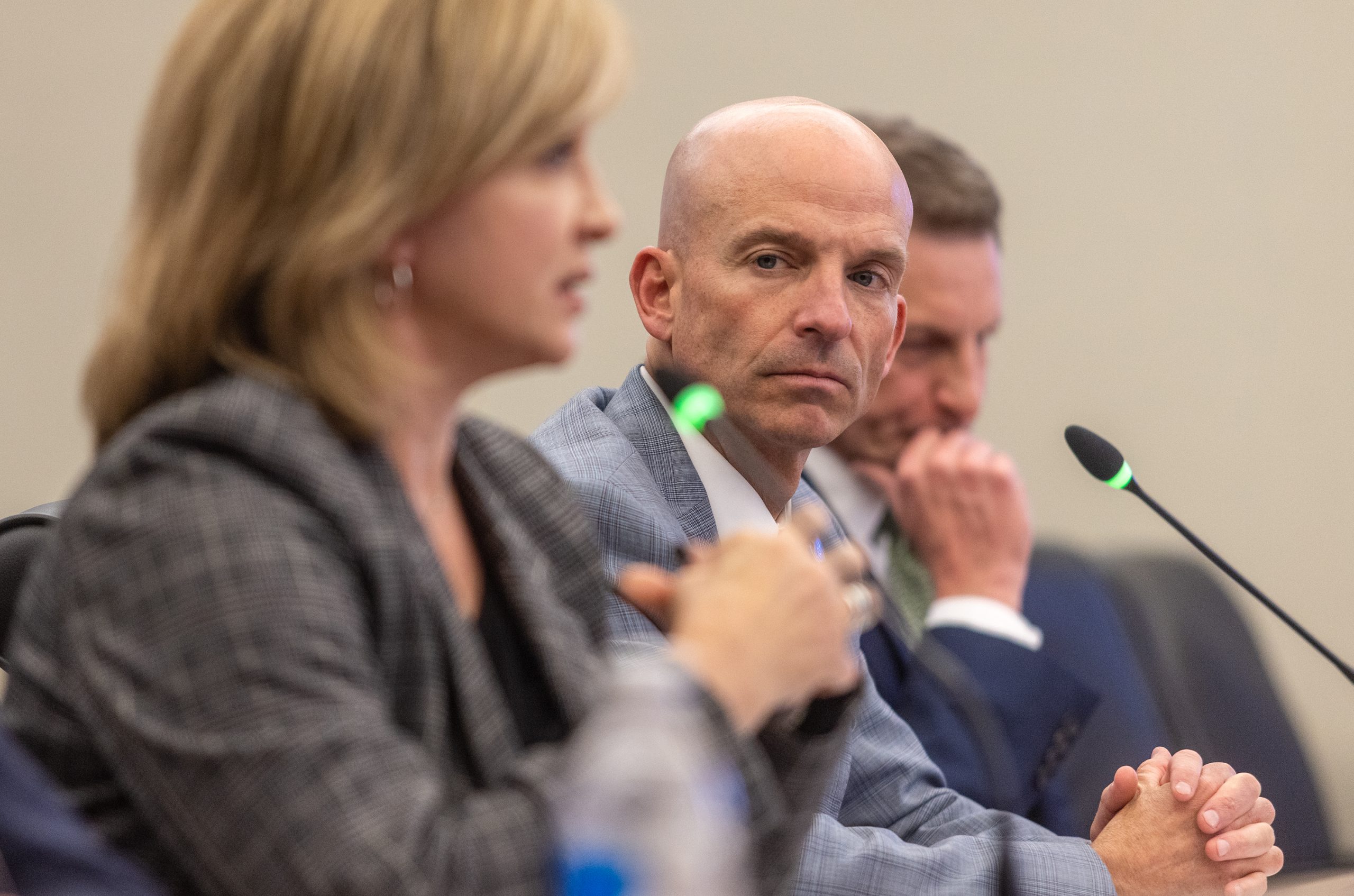Mississippi Today
UMMC to shut down LGBTQ+ clinic amid political pressure

The University of Mississippi Medical Center will dissolve the LGBTQ+ clinic that came under lawmakers' scrutiny last fall because it offered gender-affirming care like hormone therapy and puberty blockers to trans minors.
About 67 LGBTQ+ adults who have received services at the clinic this year, from routine check-ups to gender-affirming care, will be affected. It's unclear if trans adults will be able to receive gender-affirming care at other UMMC clinics.
The co-director of the center that oversees the TEAM clinic said he felt “completely blindsided” by the decision to close operations on June 30, which was made without him, and worries about the ethics of suddenly closing a specialized clinic for a marginalized group of patients.
“This is an institution responding in fear not responding in reason,” said Alex Mills, a tenure-track professor of pharmacy at University of Mississippi and the co-director of the Center for Gender and Sexual Minority Health. He oversaw operations at the TEAM clinic. “It's demoralizing and dehumanizing to the LGBTQ community.”
The surprise decision is “based in part” on a legislative committee report released last month that included recommendations for steps UMMC could take to shutter the pioneering TEAM, or “Trustworthy, Evidence-based, Affirming, Multidisciplinary,” clinic, wrote Dr. Alan Jones, the associate vice chancellor for clinical affairs, in an email Thursday morning.
“UMMC will cease operations of the clinic at the end of this academic year, June 30, 2023, read Jones' email to clinic providers. “All patients who are currently scheduled will be contacted by phone in the coming days about this change. Please work with your department chair to ensure a smooth process during this change.”
UMMC did not respond to questions about the future of clinic patients' care by the time this story published.
Services for trans kids have been limited at UMMC since executive leadership decided the clinic should stop seeing minors after lawmakers complained, according to emails obtained by Mississippi Today. Then the Legislature passed House Bill 1125 earlier this year, banning gender-affirming care for trans youth entirely.
By Thursday afternoon, the webpages for TEAM Clinic and the Center for Gender and Sexual Minority Health had been taken down from UMMC's website.
“They are erasing us,” Mills said.
He has several new patients scheduled for their first appointment at TEAM clinic tomorrow — now he doesn't know what he's going to tell them.
Immediately after receiving the email, Mills wrote to Jones' assistant requesting a meeting, hoping to ask if UMMC could postpone the shutdown for 90 days to give patients a smooth transition.
Mills got an email back from Brian Rutledge, Vice Chancellor Dr. LouAnn Woodward's chief of staff, Thursday afternoon. His request was denied.
“Dr. Jones is not able to meet, but UMMC will be handling everything regarding the UMMC TEAM clinic and its patients,” Rutledge wrote. “After this point, I would encourage you to work directly with your UM School of Pharmacy chair or dean on how this impacts your practice responsibilities within your faculty role there.”
Mills said his department chair's request to meet with Jones was also denied.
Since the decision was made without him, Mills said he doesn't know what leadership's transition plan entails.
He's planning to write up a letter to give to patients tomorrow, but he doesn't know if UMMC leadership has already made one. He doesn't know who will be notifying his patients, what they will be told or the kind of care UMMC will give them once the month is up — or even who will be their providers.
He doesn't know what will happen to the clinic space or to the three grant proposals he just submitted.
“Why isn't that being communicated to the people who run the damn clinic?” Mills said.
The legislative committee report, published by the Joint Committee on Performance Evaluation and Expenditure Review, or PEER, recommended that UMMC could dissolve the TEAM clinic by “integrating services” back into the medical center's regular care setting and offer “optional LGBTQ training courses to all staff and students.”
Even if UMMC fully follows PEER's recommendation and continues to provide gender-affirming care for trans adults, Mills said he doesn't know if it will be done in a respectful and dignified manner. What made the TEAM clinic unique, Mills said, is that it is a dedicated space where LGBTQ+ patients could be assured that every employee, from the receptionists to the nurses, believe trans people exist and would use the right pronouns.
That's why the clinic was cofounded in 2015 by Dr. Scott Rodgers, who is now UMMC's associate vice chancellor for academic affairs: To try to help LGBTQ+ Mississippians overcome one of the biggest barriers to care they face, which is finding providers who respect their sexual and gender identity.
A 2019 press release from UMMC emphasized the clinic's unique mission: to “ensure every Mississippian has access to accepting, high-quality and holistic primary health care” regardless of their gender identity or sexual orientation.
Mills feared this was going to happen ever since UMMC leadership decided the clinic should stop providing care to trans youth after lawmakers complained last fall. When that happened, Mills said he at least had some input.
“Mind you, it was secretive, but we had a meeting to discuss a plan, at least, that was appropriate and ethical,” he said. “But this is just not how leaders should work. It's not how you should be conducting yourself in any workplace. It's just a really big slap to the face.”
Now he is concerned that even if the TEAM clinic is shut down and its services are dispersed across the medical center, it still won't be enough to appease lawmakers.
“They are trying to erase a group of people,” Mills said. “If they find out it's going to be throughout other clinics, people are now going to complain and say all of UMMC is doing this.”
“I hope and pray that's not the case,” he added.
This article first appeared on Mississippi Today and is republished here under a Creative Commons license.
Did you miss our previous article…
https://www.biloxinewsevents.com/?p=246179
Mississippi Today
Pro-Palestinian protest at University of Southern Mississippi ends without confrontation
HATTIESBURG — A pro-Palestinian protest at the University of Southern Mississippi ended after an hour, with the roughly 50 students and faculty who silently held signs facing no counter-protesters or arrests — a sharp contrast to the demonstration five days earlier at the University of Mississippi.
According to a social media post, the ad hoc group, called USM for Palestine, were calling on the university to divest if it is invested in Israeli companies, echoing demands made by students across the country in the wake of the Israel-Hamas War. A university spokesperson said information about USM's investments would not be available by press time.
“All members of the University community conducted themselves peacefully and respectfully,” Nicole Ruhnke wrote in an email.
It marked the second pro-Palestine protest at a Mississippi university since students at Columbia University set up an encampment about two weeks ago with protests touching over 40 campuses across the country. On May 2, police broke up a similar protest at the University of Mississippi after some 200 of mainly white, male counter-protesters heckled, chased and threw food-related items at pro-Palestinian students.
Videos of the Ole Miss protest went viral, and the university has said it is investigating the conduct of at least one student. The Phi Delta Theta fraternity expelled from membership a student who was filmed making monkey noises at a Black female student protester.
At USM, there are significantly less Greek students, but the specter of what could happen seemed to haunt campus officials. About 20 minutes before the protest was slated to start, the university police chief, Rusty Keyes, was already patrolling Shoemaker Square, the campus free-speech zone.
Keyes pulled aside a legal observer from the Mississippi Center for Justice to say the students would only be allowed to protest for an hour because they had not followed university policy.
“Now, I'm not happy with them,” Keyes told the legal observer. “They have to go by the rules. I have the ability to (approve) time, manner and place, okay? … That's my authority, off the policy.”
“If we're going to do this … it's going to be right there so I can protect them,” he added, gesturing to a patch of grass next to a brick building to the side of the square. “There's a lot things they could've done to make it a lot easier on theirselves (sic). And the policy works with them. But they're doing everything in their power to work against it. If they would just work, they can have everything they want. But they gotta go by the policy. That's why policies and laws are in place. It's to protect everybody. And I'm going to make sure everybody is protected.”

Then Keyes asked how many people were going to show up, before gesturing at a photographer on the other side of the fountain.
“They called this photographer, they called that photographer,” he said, “and that shows right there — I mean, what's your intent, you know?”
“Their intent is just to exercise their free speech,” the legal observer replied.
“I hope so,” Keyes said. “I hope so. I want to provide that for them. But they've got to go by my instructions for their safety, okay? And then this ends at 1 o'clock, okay? By 1 o'clock. And they gotta disperse.”
When Mississippi Today tried to talk to Keyes, he said he wasn't commenting for the university and asked a reporter to delete her recording.
A few feet away, Sirena Cantrell, the dean of students, stood with her arms crossed. Student groups aren't typically allowed to hold events during finals, she noted, so the protest wasn't fair. And she was concerned that what happened at Ole Miss could happen at USM, especially because the police were stretched thin preparing for graduation. Since the protest was silent, she hoped it would be pointless to counter-protest.
“We had actually asked the group not to do this, cause of finals weeks,” she said.
Cantrell added she had tried to talk with a student from USM for Palestine, but it wasn't productive, which was, she added, “unfortunate.”
“I didn't really have a discussion with her,” Cantrell said. “I just told her the policy, and she said ‘okay,' and then I never heard from her again.”
By 12 p.m., officers had stationed themselves at all four corners of the fountain. Police cars blocked off the sidewalks to prevent people from walking too close to the protesters.
Students wearing keffiyehs began to trickle in, holding signs that said “Save Gaza,” “Nothing Justifies Genocide” and “Humanity Above Politics.” After speaking to Keyes, they shuffled over to the grass.
The protest was so silent, chirping birds could be heard over the water fountain. So could the laughter of a group of mostly male students who stood to the side.

“Because if Israel sees their signs, they'll stop shooting at Palestine,” one of the students said to snickers. He wore a blue ball cap, a gray shirt and gave his name as Tim, then “Binky.”
Rumors about the protest had been all over social media, “Binky” said, and he had been looking forward to it. But so far, he was disappointed.
“I kind of wanted it to be wild,” he said. “I was excited to watch them look stupid.”
“I think there's no sense in yelling at each other, though,” responded his friend, who wouldn't give his name. Cantrell, he added, had told them “we can't raise havoc, just like they (the protesters) couldn't.”
“The stuff at Ole Miss got taken too far,” another added. “It was funny but like, some of the shit was way too far.”
The protest was only supposed to last an hour, someone else said, and they all started laughing again.
“That's gonna stop what's going on over there,” he said. “An hour of sign holding.”
The silent protest was an attempt to follow university policy and avoid replicating the confrontational atmosphere of Ole Miss' protest, said Willem Myers, a 22-year-old social work major who was acting as USM for Palestine's spokesperson.

Though they hadn't anticipated the Keyes' restrictions, Myers noted the mood was calmer than at a protest he attended at Tulane University in New Orleans, where police broke up an encampment and arrested 14 people, including him. Myers had to get permission to leave the city, where he lives, to be on campus that morning for an exam.
The goal was to support Palestinians, said Myers, who is Jewish. He disagrees with the idea that Israel “speaks for or is in the best interest of the Jewish people.”
“What we're seeing overwhelmingly from people who are on the frontlines and who are in Rafah is that they are emboldened by and given hope by the actions of student protesters throughout the world right now,” he said. “The fact is that we don't exist in a vacuum, we're not an island here at USM or in Mississippi. We're part of the larger U.S. imperialist project, and we are firmly standing against it … to have it on record that USM students do not stand with the ongoing genocide and violence against Palestinians.”
At 1 p.m., the protest was over. Students clapped briefly, then started packing up.
As police watched, a white student in a blue shirt walked up to them. He asked what “the rules” were and why he wasn't allowed to talk to the protesters, “because it's a public university.”
“If you want to communicate with them, wait till they leave,” Keyes responded. “We just want to keep this area safe.”
Though the student, a 23-year-old finance major who declined to give his name, was friends with the group that was making jokes, he said he actually wanted to have an open dialogue with the protesters. He would've liked to ask what their “end goal” was.
He said he already knew their answer would be a ceasefire, but he wasn't sure that was possible in the Middle East where, he said, “it's built into their culture not to like each other.”
But it's like that here, too, he said. In America, political beliefs are becoming more polarized due to “Big Tech” and misinformation. Though he identifies as a conservative, is in a fraternity and plans to vote for Donald Trump, the student said he also opposes the military industrial complex — but where else, except for a protest like this, would he have an opportunity to actually talk with people on the other side?
“I guess I do,” he said, when asked if he agreed with the protesters. “I guess I do, in a way. I think I saw a big sign that said ‘‘ceasefire.' Yeah, I do agree with that. I agree with a ceasefire. Of course. Why would I want more people to die?”
This article first appeared on Mississippi Today and is republished here under a Creative Commons license.
Mississippi Today
State revenue is sluggish, but interest from federal COVID-19 money is buoying budget

Mississippi is collecting enough money to fund the current year's budget passed by the Legislature in 2023 — largely due to interest earnings on federal COVID-19 money — but tax collections remain sluggish.
April's revenue, just released by the staff of the Legislative Budget Committee, was $6.87 million or 0.65% over the estimate. But actual tax collections were $1.3 million below the estimate.
The reason total revenue for April was above the estimate is the interest earnings the state is garnering on its surplus money. For the month of April, interest earnings were $8.2 million above the estimate, thanks to the unprecedented amount of surplus money largely from federal COVID-19 spending and because of high interest rates.
Through April, the first 10 months of the fiscal year, interest earnings are $93.4 million above the estimate. Interest earnings are more than half of the total collections above the estimate of $185.8 million for the year.
For the fiscal year to date, revenue is .39% or $24.7 million above the previous year. Without interest earnings, the state would be collecting less revenue that it did the previous year.
The sluggish collections report for April was released just as the Legislature was finalizing a budget for the upcoming fiscal year, which begins July 1.
For the upcoming fiscal year, the budget, including all state support funds, will be $7.28 billion or $583.2 million more than was budgeted for the current fiscal year. That number excludes the use of surplus funds to pay for one-time construction projects throughout the state.
Kindergarten through 12th grade education will receive $246 million or 8% of the increased funds while universities will receive an additional $60.8 million or 7.5% more than they received for the current year. Community colleges will receive an additional 18% or $53 million.
The Legislature is in an unusual position of being able to make record expenditures even as revenue collections appear to be slowing, thanks, in large part to COVID-19 relief funds and other federal funds.
But many legislative leaders said during the just completed session that they will continue to monitor collections that could impact budgeting in future years if the trend continues.
For the year, state income taxes are down $131.2 million or 6.6%. That, according to state Economist Corey Miller, is attributed at least in part to the $525 million income tax cut that currently is being phased in over a four-year period. Sales tax collections are up $71.7 million or 3.2%.
This article first appeared on Mississippi Today and is republished here under a Creative Commons license.
Mississippi Today
Ex-Mississippi sheriff admits lying to the FBI
As sheriff, Terry Grassaree stoked fear into the citizens of Noxubee County by imitating his idol, wrestler “Stone Cold” Steve Austin.
On Tuesday, the 61-year-old former law enforcement officer spoke in a soft voice to District Judge Daniel P. Jordan III as he pleaded guilty to lying to the FBI when he denied that he made a jailed woman take and share sexually explicit photos and videos of herself.
He faces up to five years in prison and a $250,000 fine when he is sentenced on Aug. 7.
Assistant U.S. Attorney Kimberly Purdie told District Judge Daniel P. Jordan III that Grassaree lied to an FBI agent on July 13, 2020, about making a woman behind bars take and share nude photos and videos in exchange for favorable treatment, which included making her a jail trusty.
After she texted the photos from a contraband cell phone, he responded, “Butt is great” and “Body looks perfect.”
Standing next to his attorney, Abram Sellers of Jackson, Grassaree admitted all of what Purdie had said was true.
Grassaree was also charged with destroying evidence and wire fraud. If he had pleaded guilty to all of his charges, he could have faced up to 90 years in prison.
But his story goes far beyond what the former sheriff pleaded guilty to on Tuesday.
The Mississippi Center for Investigative Reporting at Mississippi Today and The New York Times highlighted Grassaree in its series, “Unfettered Power: Mississippi Sheriffs,” which showed how sheriffs can rule like kings in rural counties. They answer to no one and typically face little press or prosecutorial scrutiny.
The investigation published April 11, 2023, revealed that the allegations of wrongdoing against Grassaree have been far more wide-ranging and serious than his federal charges suggest. The investigation included a review of nearly two decades of lawsuit depositions and a previously undisclosed report by the Mississippi Bureau of Investigation.
At a minimum, the documents detail gross mismanagement at the Noxubee County jail in Macon that repeatedly put female inmates in harm's way. At worst, they tell the story of a sheriff who operated with impunity, even as he was accused of abusing the people in his custody, turning a blind eye to women who were raped and trying to cover it up when caught.
Over nearly two decades, as allegations mounted and Noxubee County's insurance company paid to settle lawsuits against Grassaree, state prosecutors brought no charges against him or others accused of abuses in the jail. A federal investigation dragged on for years and finally led to charges in fall 2022.
In a 2020 lawsuit, Elizabeth Layne Reed accused two deputies, Vance Phillips and Damon Clark, of coercing her into having sex. She said the men gave her a cellphone and other perks in exchange for sexual encounters inside and outside the jail. Deputies even put a sofa in her cell.
According to her lawsuit, Grassaree knew all about his deputies' “sexual contacts and shenanigans,” but the sheriff did nothing to “stop the coerced sexual relationships.”
Grassaree has previously denied any knowledge of what his deputies were doing. “Are you a boss?” he asked. “Do your employees tell you everything they do?”
Instead of intervening, the lawsuit alleged, the sheriff “sexted” her and demanded that she use the phone the deputies had given her to send him “a continuous stream of explicit videos, photographs and texts” while she was in jail. She also alleged in the lawsuit that Grassaree touched her in a “sexual manner.”
The lawsuit was settled for an undisclosed amount.
No date has been set for the sentencing of one of those deputies, Phillips, who pleaded guilty last year to bribery, which experts say could have been the perks the woman says she received. Prosecutors asked for his sentencing to be postponed “pending a resolution of another criminal matter,” an obvious reference to Grassaree's case.
The other deputy, Vance, wasn't charged. “I never coerced Reed into sex,” he wrote in his response to the lawsuit, but he never answered whether he had sex with her.
Under Mississippi law, it is a crime for officers to have sex with those behind bars, and the felony carries up to five years in prison.
Nearly two decades ago, Grassaree faced allegations of rape inside the jail that he supervised and lawsuits claiming that he covered up the episodes. At least five people, including one of his fellow deputies, accused him of beating others or choking them with a police baton.
In 2006, after Grassaree and his staff left jail cell keys hanging on a wall, male inmates opened the doors to the cell of two women inmates and raped them, according to statements the women gave to state investigators. One of the women said Grassaree pressured her to sign a false statement to cover up the crimes, according to the state police report.
About a year later, in a lawsuit, four people who had been arrested gave sworn statements accusing Grassaree of violence. Two of the people said he choked or beat them while they were in his custody. A third said he pinned her against a wall and threatened to let a male inmate rape her.
All told, at least eight men — including four deputies and Grassaree himself — have been accused of sex abuse by women inmates who were being held in the Noxubee County jail while Grassaree was in charge.
Now, 18 years after a woman first said that he pressured her to lie about being raped, the former sheriff faces possible prison time.
This article first appeared on Mississippi Today and is republished here under a Creative Commons license.
-
SuperTalk FM5 days ago
Driver’s education set to become mandatory in Mississippi as bill passes
-
SuperTalk FM4 days ago
State approves $160M to expand Highway 7 to four lanes in Lafayette County
-
SuperTalk FM1 day ago
Legislation outlawing ‘squatted’ vehicles in Mississippi signed into law
-
Mississippi Business7 days ago
Geartek expanding operations in Alcorn County
-
Mississippi News2 days ago
LCSO wants people aware of a scam circling the area
-
Mississippi Today3 days ago
On this day in 1917
-
Mississippi News6 days ago
Altercation at Mississippi police department leads to officer-involved shooting
-
Mississippi News2 days ago
Winston Co. Sheriff’s Office investigates shooting at Dave’s Club
















![HIGH SCHOOL SOFTBALL: Ocean Springs vs. Petal (MHSAA Playoffs) [05/06/24]](https://www.biloxinewsevents.com/wp-content/uploads/2024/05/1715142256_maxresdefault-400x240.jpg)
![HIGH SCHOOL SOFTBALL: Ocean Springs vs. Petal (MHSAA Playoffs) [05/06/24]](https://www.biloxinewsevents.com/wp-content/uploads/2024/05/1715142256_maxresdefault-80x80.jpg)
![HIGH SCHOOL BASEBALL: Vancleave vs. East Central (MHSAA Playoffs) [05/06/24]](https://www.biloxinewsevents.com/wp-content/uploads/2024/05/1715140398_maxresdefault-80x80.jpg)
















